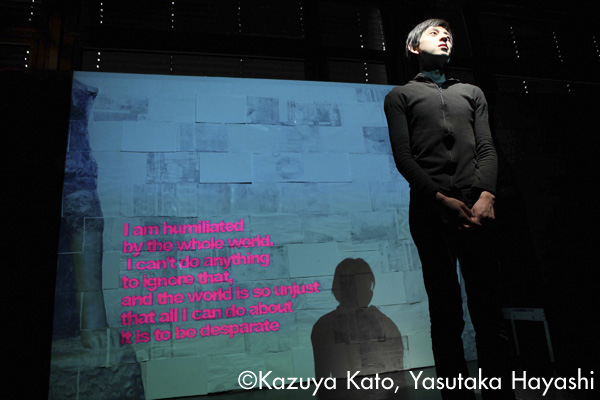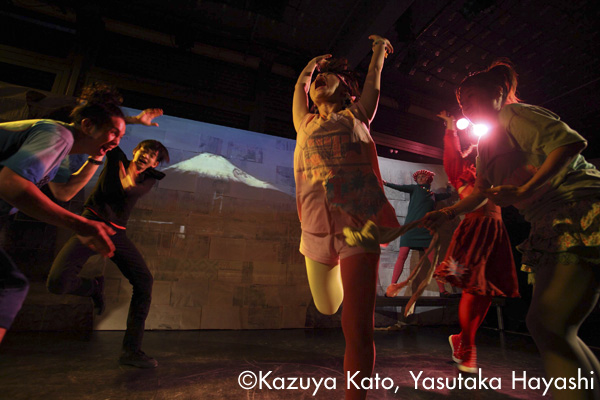At the back of the stage, two panels with images of the “Hachiko” statue stand symmetrically opposed to the right and left, and between them is a screen showing images of the crowded confusion of streets of Shibuya. With each scene, different videos, still photos and text appear on the screen.
Techno begins a monologue. He introduces himself as a person whose only interest is techno music, and having no other concerns or aims in life, he considers himself particularly narrow-minded, even for a Japanese. Then he talks about an encounter he had a week earlier. When he went out to get a haircut, he saw a pigeon that was walking around with its head split open and its brain showing. Hung up on the fact that he can find no relationship between himself and the pigeon, Techno is dismayed at the irrationality of the world.
The scene returns to the crowded streets of Shibuya. Hakase is trying to get his half-Dutch wife, half-human prostitute “Soft-touch” to fish the crowd for customers. Hakase believes a theory that human sex will die out by the year 2080 and his ambition is to make his prostitutes earn as much as they can for him while sex still sells so that he can create a “Shibuya University” where students can engage in the study of new subjects. But, Soft thinks the question of whether or not love is necessary for sex is an important issue.
Techno happens by. Hakase used to be his classmate, but it seems that he was the victim of bullying. Hakase is trying hard to get Techno to buy a trick with Soft, but Techno refuses, saying he will only take Hard.
Techno begins another monologue. He recalls a composition he wrote in elementary school. He wanted to write that he liked reptiles, but he ended up writing it over with a meaningless lie that he liked mammals. He recalls how bad that made him feel. Hakase and Soft break in with their own thoughts, but the three are all talking on their separate tangents and none of what they are saying meshes as conversation.
Suddenly a woman appears, claiming to be from the future. “I was born in 2062 and am 18 years old,” she says, “And in the future, nobody wears things like clothes.” She is startled when Techno objects the “Wearing no clothes at all is filthy,” and begins to thrash his own body violently in protest. Quickly, the woman from the future puts on a mismatch of clothes from different periods. The woman from the future appears to like Techno, but he rejects her for her poor, out-of-date fashion sense and walks away. Soft tries to give the women from the future a quick lesson in fashion, but none of her meaning gets through to the woman.
In front of the Hachiko statue, the fully automated mechanical Dutch wife “Hard” is trying to pick up customers. She is Soft’s younger sister and is virtually devoid of anything like emotions. As a result she has no qualms about her profession. Considering that it is Hard, Techno is about to buy some sex with her, until the woman from the future comes along and begins to protest vehemently about the idea of buying sex. She tries to offer herself to Techno for free, but his response is cold.
Techno begins a monologue about his hairstyle, until Hakase breaks in and, to the sounds of loud music, they begin a battle interspersed with dance. The woman from the future tries to break it up. She puts a price of 20,000 yen on herself and Techno decides to by her. In front of Hachiko the two begin to exchange words of love.
An argument breaks out between Soft and Hard. They have completely different views about sex and its relationship to love and money. Hakase appears and tries to get them to pick up customers again, but Soft complains that she is too disheartened to work.
Inserted here is a pop dance routine by the full cast.
Techno comes on stage. He says that he dislikes the idea of having sex with a lover for free because it seems like nothing more that a pursuit of physical pleasure. With the five billion yen he has just won in the lottery, he decided to buy Hard. After Techno and Hard have left, Hakase proclaims that he is going to establish a Shibuya University in the future. Believing the urban myth that if you walk between the two statues of Hachiko you can enter into the future, he takes off his clothes, throws them aside and heads off between the statues toward the future.
Soft is the only one left behind. In her eyes she sees only the scenes of Shibuya. Bicycles, cars, men, women, children, sun and sky, sky, sky, the theater and the audience. Then she shouts.
“I have found it! Will you call me by my name? My name is …….. !”
With her cry left in mid-phrase, the stage lights go out.




